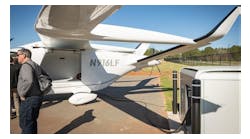ACPA Names Recipients of Annual Excellence in Concrete Pavements Awards
The American Concrete Pavement Association (ACPA) has named recipients of its 28th Annual “Excellence in Concrete Pavements” awards, which recognize quality concrete pavements constructed in the United States and Canada.
The awards program encourages high-quality workmanship in concrete pavement projects, and serves as a way to share information about challenging and highly successful projects. This year’s 29 awards were selected from 78 total submittals. In all 21 contractors won awards for projects in 12 ACPA-affiliated Chapter/State areas.
Thirty-six judges representing various stakeholder groups throughout the transportation-construction community evaluate projects for the award consideration. The program recognizes contractors, engineers, and project owners who completed outstanding projects. The program requires projects to be completed in the calendar year prior to judging (2017). The recipients of the 2017 ACPA Excellence Awards are:
Reliever & General Aviation Airports
(Silver Award) Jack Edwards National Airport Improvements, Gulf Shores, Ala.
Contractor: A.G. Peltz Group, LLC
Owner: Jack Edwards National Airport
Engineer: Barge, Waggoner, Sumner and Cannon, Inc.
As tourism in this resort city and overall region has increased, the Jack Edwards airport has seen increased demand for additional aircraft apron areas that can accommodate all types of aircraft, including heavy aircraft. In response to these increasing demands, the Federal Aviation Administration granted funds to construct a new heavy aircraft apron.
A.G. Peltz Group* won a competitive bid to construct the new heavy aircraft apron. The scope of work included taking a greenfield site and performing the required grading, drainage, base, pavement, aircraft tie downs, and lighting for the new apron. The pavement section consists of a 6 in. P-304 cement treated base layer and a 15 in. P-501 plain jointed concrete pavement layer.
A.G. Peltz performed both the cement-treated base and concrete paving required to complete the project. The pavement was constructed in 30 ft paving widths to shorten the duration of the pavement placements and try to recover time lost during the grading phase of the project. In spite of an unusually wet spring that caused delays, the 27,555 SY heavy aircraft apron now serves the air travel needs of the region, and allows aircraft up to 737 class. This apron will now allow the airport to accept a larger volume and larger size of aircraft.
(Gold Award) Reconstruction Project at Northwest Missouri Regional Airport, Maryville, Mo.
Contractor: Ideker, Inc.
Owner: City of Maryville, Missouri
Engineer: Jviation, Inc.
Pavement evaluations on Runway 14-32 at the Northwest Missouri Regional Airport in Maryville, Missouri, resulted in low Pavement Condition Index numbers for a portion of the runway, north turnaround, and the northernmost taxiway connector from the apron. Also, deterioration of the north 4,000 ft. of the runway since 2011 required emergency replacements of select concrete panels on an annual basis.
Ideker, Inc. proved they were up to the task of completing this challenging project. Because of these factors, a comprehensive reconstruction project was required and involved the removal and replacement of the existing pavement. The project involved pavement demolition; fly ash stabilization of the subgrade; in-place recycling of the existing 6 in. concrete and reuse as aggregate base course; drainage pipe installation; underdrain construction; and a new edge lighting system.
The airport was closed for the duration of the project to allow for the complete removal and replacement of the northernmost 4,000 ft. of runway pavement. In all, 38,000 SY of 6 in. concrete pavement was placed over the recycled concrete aggregate and subgrade. A geotextile fabric between the subgrade and base course minimized the amount of fines entering the base course.
Weather delays and unanticipated poor subgrade conditions complicated the project, but the contractor and other project partners worked through these issues together to keep the project moving forward with minimal delays.
Ideker used stringless grade control for establishing the finished subgrade elevations, finished recycled concrete base course elevations, and placement of the concrete. Ideker also sequenced paving lanes so to avoid driving on the subbase during paving.
The consistent thickness results and profilograph results—with no deficiencies to correct—are a testament to the tight grade control and attention to detail that was achieved during the project.
In addition, the specifications were exceeded for flexural strength gain for this project. The smooth ride of the new runway exhibits the high quality of workmanship that was achieved on this project.
Commercial Service & Military Airports
(Silver Award) Runway 14-32 Rehabilitation, Pittsburgh International Airport, Findlay Township, Pa.
Contractor: Golden Triangle Construction Company, Inc.
Owner: Allegheny County Airport Authority
Engineer: Michael Baker International
When bids were let for the reconstruction of the cross wind Runway 14-32, Golden Triangle was the successful bidder on all six construction bids.
The project involved removal and replacement of 185,936 SY of concrete pavement. All the concrete was produced using Golden Triangle’s portable batch plant set up on airport property about 20 minutes from the project site.
In addition to the concrete pavement replacement, the project included subgrade, base, and drainage improvements along with complete asphalt shoulder replacement, as well as electrical circuit, lighting, and airfield signage replacement.
The original concrete pavement was crushed to a 2A or R4 gradation and was either used on the project or was stock piled on airport property for future reuse by the owner. All the bituminous asphalt was milled and stockpiled on site for future reuse by the owner.
Precise grade control was a must as the runway intersected with two other parallel runways and intersected with 10 taxiways. The initial phases used traditional string line paving techniques, and then transitioned to GPS and stringless technology.
Close coordination was required with multiple subcontractors, as well as multiple prime contractors on adjacent airport projects. There were also rigorous quality control requirements to meet FAA specifications, and testing results confirmed consistency.
Making this project even more challenging were the many sub-phases of each of the six construction phases, which led many working restrictions and extremely tight time frames. In spite of all these factors, project milestones and completion dates were met and the owner and air travelers to the region now have a reliable, high quality facility.
(Gold Award)
Project: Runway/Taxiway Reconstruction, Wayne County Airport, Romulus, Mich.
Contractor: Ajax Paving Industries, Inc.
Owner: Wayne County Airport Authority
Engineer: RS&H
Arguably one of the greatest challenges facing the Wayne County Airport Authority recently was the reconstruction of Detroit Metro Airport’s Runway 4L/22R, which is vitally important to the airport, as well as air traffic in southeastern Michigan.
Located in the world’s automotive capital, the airport commonly known as Detroit Metropolitan Airport (DTW) serves more than 30 million passengers per year. As one of the busiest airports in the region, the facility generates over $10 billion in economic impact annually.
The project consisted of nearly 450,000 SY of concrete pavement, encompassing 6.5 miles of airfield space, making this project the largest airport concrete pavement project constructed in the United States at the time. The runway is 10,000 ft long and 150 ft wide, and in high demand, so the airport authority had to “fast track” the design and construction.
Typically, the runway is used for aircraft arrivals and can accommodate operations in low-visibility conditions, making it critical to the airport’s operational efficiency and business continuity. The project also involved reconstruction of the associated taxiway system, providing a safe connection for aircraft from the runway to the passenger terminals at Detroit Metro Airport.
In addition to quick and efficient design and construction, the planning, design, and construction incorporated sustainable practices, including the re-use of stormwater for dust control during construction, along with other initiatives proposed by the contractor during construction. This monumental project was completed on schedule, allowing Ajax to achieve the maximum allowable incentives outlined in the contract.
In July 2016, ACPA hosted its Airport Pavement Design & Construction Best Practices Workshop near Detroit Metro Airport. As part of the workshop, the project was highlighted and workshop participants had the opportunity to tour of the construction.



